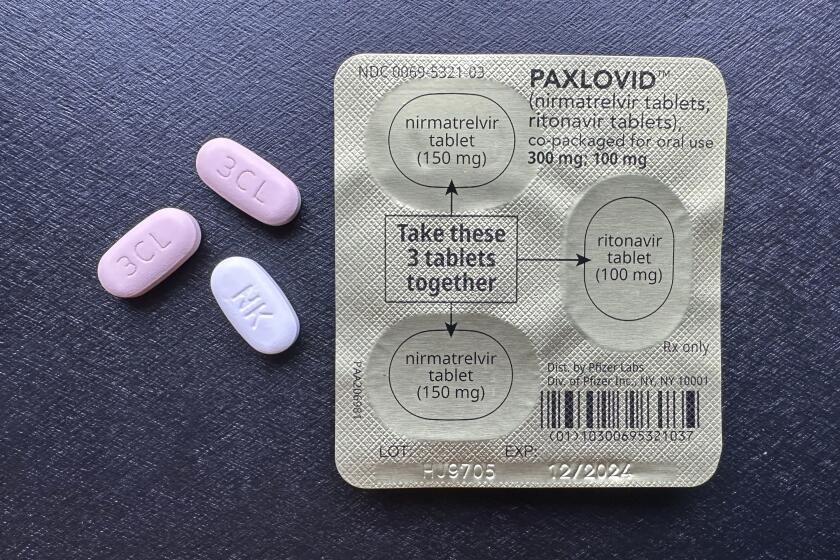Opinion: Don’t be stupid: Skipping your COVID booster could reduce your IQ

- Share via
The nation’s COVID-19 vaccination effort is failing. Last year, only 22% of adults received the latest COVID booster, which is less than half the rate of vaccination for the flu — even though COVID is twice as deadly.
Amid growing concern about the effects of long COVID and ahead of a likely surge in infections this winter by an even more contagious variant, we need more effective public health messages to encourage immunization.
Much has been made of COVID’s consequences for overall health, productivity and the economy. But recent research suggests a compelling new basis for vaccine advocacy: COVID’s capacity to reduce intelligence.
Column: Anthony Fauci has a right to savage Trump. His memoir takes a different and telling approach
The physician and researcher who weathered the COVID pandemic, the HIV/AIDS crisis and countless Republican conspiracy theories has a new book.
Using data from more than 100,000 people who completed online tests in England, the authors of a study published by the New England Journal of Medicine found that those recovering from COVID, including those with only mild symptoms, had measurable cognitive deficits. Even participants who had “mild COVID-19 with resolved symptoms” exhibited deficits “commensurate with a 3-point loss in IQ” compared with uninfected participants.
The cognitive loss was more pronounced in those who experienced more severe infections. Participants who had long COVID — that is, with symptoms that lasted more than 12 weeks — had the equivalent of a 6-point IQ loss on average, and those who had been “admitted to the intensive care unit had the equivalent of a 9-point loss.”
The study’s results, which are buttressed by those of an earlier observational study in Norway, are not widely known. Yes, many people know that COVID infections might lead to short-term “brain fog,” but these studies raise the prospect of cognitive deficits that can last for years. This suggests yet another reason to get the vaccine: It may protect your intellect.
Debates about the latest quarantine rules miss what matters most to fight COVID in 2024.
Many people regard their ability to reason as a core aspect of their identity; that’s one reason the prospect of dementia is so frightening. This research suggests that getting your booster may be one way to preserve that ability and promote brain health. If you want to keep solving Wordle or the Saturday crossword, you have an additional reason to get boosted.
This message is especially important for younger populations who perceive themselves as being at lower risk. These findings underscore the point that COVID-19 is not just another flu; its potential to cause lasting cognitive impairment is too significant to ignore. Young people, whose more active social lives often drive the spread of COVID, can safeguard not just their health but also their intelligence and their futures by getting vaccinated.
Many young people accept the risk of infection based on their robust physical health but underestimate the virus’ potential to cause long-term neurological damage. The fact that even mild cases of COVID can lead to such significant harm could help challenge the prevailing complacency about vaccination.
Public health messages about vaccination have often focused on helping others, particularly the elderly. And it does:A study published by the Lancet last year found that every 150 people who got boosted prevented one emergency room visit for COVID. But while it’s good to do something for others, research suggests that self-interest is a stronger motivator — especially since the jabs are often accompanied by short-term aches, fever and other symptoms as our immune systems ramp up in response. Such downsides seem like a small price to pay for the precious benefit of preserving intelligence.
We should emphasize the cognitive health consequences not to promote fear of the disease but to foster an informed understanding of it. There is still much that we don’t know about COVID’s long-term consequences for cognitive function and whether they will persist as new variants emerge. But we know enough to urge the public to think about not just surviving the virus but also thriving after they recover.
We are now armed with data that underscore unforeseen risks of the virus that should be especially alarming to younger people who put great store in their mental acuity. That should motivate more of us to bolster our communal defenses against this formidable disease.
It’s smart to be fully vaccinated, of course: That’s why more than 95% of a group that knows COVID better than most — physicians — get their shots. But vaccination can also help keep you smart. We should all bear this in mind when we decide whether to get our COVID boosters this fall.
Ian Ayres is a professor at Yale Law School. Lisa Sanders is a professor at the Yale School of Medicine and the director of Yale’s Multidisciplinary Long Covid Care Center.
More to Read
A cure for the common opinion
Get thought-provoking perspectives with our weekly newsletter.
You may occasionally receive promotional content from the Los Angeles Times.












